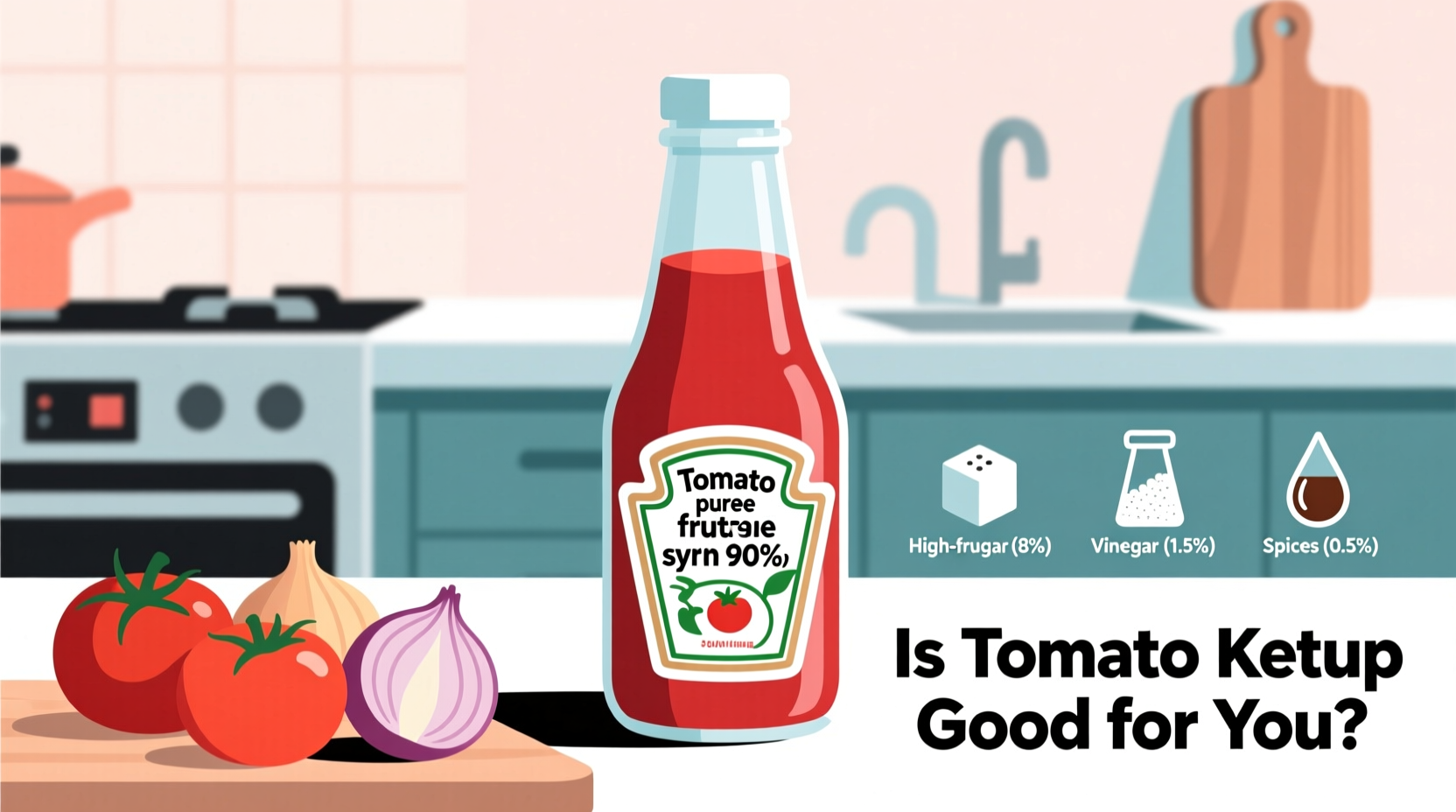When you reach for that familiar red bottle, you're probably wondering: is tomato ketchup good for you beyond just flavoring your fries? The answer isn't simply yes or no—it depends on ingredients, portion size, and your individual health goals. Let's cut through the confusion with evidence-based insights you can actually use.
What's Really Inside Your Ketchup Bottle
Understanding tomato ketchup nutrition facts starts with examining its components. Traditional ketchup combines tomato concentrate, vinegar, sugar, salt, and spices. The nutritional profile varies significantly between brands, particularly regarding sugar content.
| Brand | Serving Size | Sugar (per tbsp) | Sodium (per tbsp) | Calories |
|---|---|---|---|---|
| Major Brand A | 17g | 4g | 167mg | 15 |
| Major Brand B | 17g | 3.9g | 150mg | 15 |
| "No Sugar Added" Brand | 17g | 1.5g | 190mg | 10 |
| Homemade (basic recipe) | 17g | 2.5g | 85mg | 12 |
Data sourced from USDA FoodData Central shows that while ketchup contains minimal fat and protein, its carbohydrate content primarily comes from added sugars. This nutritional reality check helps explain why is tomato ketchup healthy for weight loss remains a common concern among health-conscious consumers.
The Tomato Advantage: Lycopene Benefits

The tomato base provides lycopene, a powerful antioxidant with documented health benefits. Research published in the American Heart Association Journal indicates that lycopene may support cardiovascular health by reducing oxidative stress.
Interestingly, the cooking process actually increases lycopene bioavailability compared to raw tomatoes. This means tomato ketchup nutrition facts include more accessible lycopene than fresh tomatoes in some cases. However, the sugar content often offsets these benefits in commercial varieties.
Sugar and Sodium: The Hidden Concerns
Most commercial ketchups contain high fructose corn syrup or added sugars—typically 4 grams per tablespoon. To put this in perspective, the American Heart Association recommends no more than 25 grams of added sugar daily for women and 36 grams for men.
Consider this real-world scenario: a typical fast-food meal with fries and burger might contain three to four tablespoons of ketchup, adding 12-16 grams of sugar before you even consider other menu items. This context explains why many wonder is tomato ketchup good for you when consumed regularly with standard American meals.
Smart Consumption Strategies
You don't need to eliminate ketchup entirely—just approach it strategically:
- Portion control: Use one tablespoon instead of free-pouring
- Read labels: Choose brands with lower sugar (under 3g per serving)
- Check ingredients: Avoid high fructose corn syrup when possible
- Consider timing: Pair with protein/fat to slow sugar absorption
For those managing diabetes or hypertension, these small adjustments make ketchup consumption more compatible with health goals. The National Institutes of Health notes that moderate consumption of tomato products can fit within balanced dietary patterns when sugar intake is monitored.
When Ketchup Might Not Be Your Best Choice
Certain health conditions require extra caution with ketchup:
- Diabetes management: The sugar content affects blood glucose levels
- Hypertension: Sodium content contributes to daily intake limits
- Gastroesophageal reflux: Acidic ingredients may trigger symptoms
- Low-FODMAP diets: Some varieties contain problematic sweeteners
This context boundary matters significantly when evaluating tomato ketchup sodium content concerns for specific health conditions. The American Heart Association recommends no more than 1,500mg of sodium daily for optimal heart health—meaning just 8-10 tablespoons of ketchup could represent 10% of that limit.
Healthier Alternatives Worth Considering
If you're questioning is homemade tomato ketchup healthier than store-bought, the answer is generally yes—with caveats. Simple homemade versions using tomato paste, vinegar, minimal sweetener, and spices let you control ingredients completely.
Other alternatives worth exploring:
- Salsa: Typically lower in sugar, higher in fresh vegetable content
- Sugar-free tomato paste: Diluted with vinegar for tang
- Mustard varieties: Generally lower in sugar and calories
- Roasted red pepper spread: Natural sweetness without added sugar
Remember that tomato ketchup nutrition facts compared to other condiments show it occupies a middle ground—healthier than mayonnaise in fat content but often higher in sugar than mustard or hot sauce.
Making Informed Choices
The evolution of ketchup recipes reveals how consumer demand has shifted toward healthier options. While traditional formulations relied heavily on sugar for preservation and flavor balance, modern "reduced sugar" and "organic" varieties offer alternatives with better nutritional profiles.
When evaluating whether tomato ketchup is good for you, consider these practical questions:
- How much am I actually using per serving?
- What are my daily sugar and sodium limits?
- Are there specific health conditions I need to accommodate?
- What are my overall dietary patterns beyond this single condiment?
By answering these questions honestly, you can determine whether ketchup fits your personal health equation without needing absolute "good" or "bad" labels.











 浙公网安备
33010002000092号
浙公网安备
33010002000092号 浙B2-20120091-4
浙B2-20120091-4